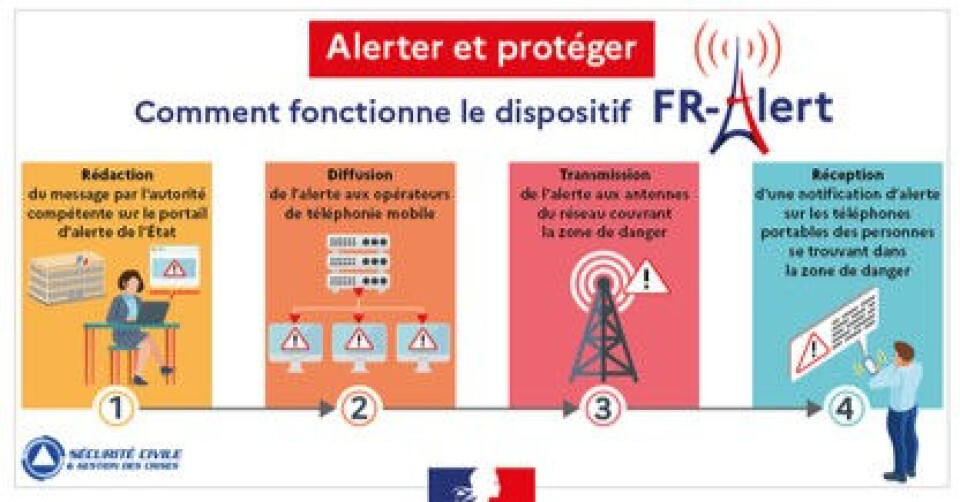-
Is health insurance required to return to visit England from France?
Certain health access remains free at the point of use for all
-
Do self-employed people in France put their personal assets at risk?
Rules for self-employed workers are different than for employees
-
Are there noise rules for motorcycles in France?
‘Sound radars’ may soon come into force following trial
Will France’s FR-Alert warning system work with foreign phones?
In case of a serious incident such as a natural disaster or a terrorist attack, people could receive a warning notification under this new system. We explain how it works

Reader Question: I was reading about France’s new FR-Alert warning system and wondered if it would work with foreign mobile phones too? I only have a UK phone and use it on trips to my second home in Hérault. Can I receive alerts in the case that there are more extreme weather events, such as the flooding we had this summer.
Yes it is possible for the alert to be sent to foreign phones. To understand why, we first need to explain what the alert is.
What is FR-Alert?
FR-Alert is a new messenger alert system brought in this year to warn people of potential natural disasters, terrorist attacks or other incidents that threaten their safety or security.
People who live within a certain area that is considered to be under threat will receive a notification on their phone warning them of the situation and giving advice on what to do – whether it is staying indoors, seeking more information from a government website, etc.
The official French government information says the notification will arrive on your phone with a beep alert and a vibration, even if your phone is on silent mode.
You will not receive a notification if your phone is not able to connect to mobile internet data using recent 4G or 5G technology, nor will it work if the phone is turned off, on flight mode or you are using a non-French phone and your data roaming is turned off.
The scheme is expected to be expanded later on so phones running only on the more basic 2G and 3G systems will also benefit.
How are the alerts sent out?
Using mobile internet networks is more efficient than, for example, a previous system that relied on users downloading an application, called the système d'alerte et d'information des populations (SAIP) and that very few people actually downloaded, or other similar systems that involve sending out an SMS to people, that can lead the network to be overloaded.
For FR-Alert the mobile networks send out the alerts, using technology to target phones that are in the affected zone but the alert itself is not sent as an SMS, but rather over the 4G or 5G internet service.
A government official writes the alert, it is sent to the mobile networks – for example Bouygues Telecom or Orange – which then send out the alert to the mobile phones in the affected area, as shown in the graphic below.

Credit: Ministère de l'Intérieur / https://mobile.interieur.gouv.fr/Le-ministere/Securite-civile/Nos-missions/L-alerte-et-l-information-des-populations/Dispositif-FR-Alert
If you have a phone with a foreign sim, when you connect to mobile internet your phone will automatically connect to a local operator and so you will receive the notification.
For what events are the alerts sent out?
- Natural disasters such as flooding, storms, wildfires
- Chemical or biological incidents (pollution, gas leaks, nuclear incidents, etc.)
- Health threats (epidemics, etc.)
- Major technological incidents (plane crash, mass internet blackout, industrial-scale disaster, etc.)
- Threats to public security, including terrorist attacks
Does the government get access to people’s private data?
No, the government will not be able to access your location or any other private data.
Related articles
Storm damage in France: How to manage an insurance claim for your home
France’s ‘catastrophe naturelle’ insurance system: how to claim
‘Over 100mm rain in an hour’: Hérault and Gard hit by heavy downpour
























